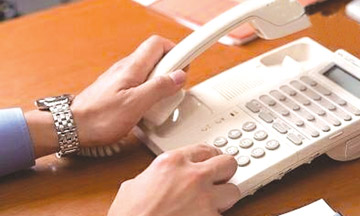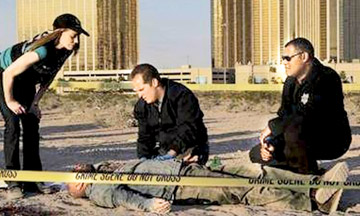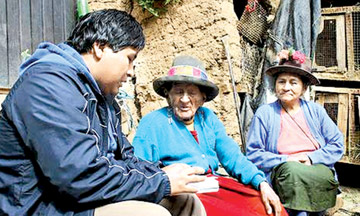|
Journalism tips on putting the truth jigsaw together:
Handling rumour, speculation and damnable lies!
Gaston de ROSAYRO
|

Contacting the responsible authorities to find out whether the
received information is true or false |
Going by our last couple of discussions you should now have some
reasonably clear guidelines on how to present facts and opinions in the
news. However, ordinary people do not operate by journalism's rules of
checking accuracy and finding proof. In day-to-day conversation most
people are not so careful about the accuracy of facts.
Take the example of a man who runs into your newsroom shouting: "The
Towers Building has fallen down! Hundreds of people have been hurt!" He
most certainly has not stopped to survey the extent of the damage or
count the number of people injured. It may turn out that one wall has
collapsed into the street and has injured six people. That is news. What
the man was giving us was speculation. When other people repeat such
speculation without checking its accuracy we have the spread of a rumour.
Journalism's first obligation is to the truth. Democracy depends on
citizens having reliable, accurate facts put in a meaningful context.
Journalism does not pursue truth in an absolute or philosophical
sense, but it can, and must pursue it in a practical sense. This
'journalistic truth' is a process that begins with the professional
discipline of assembling and verifying facts. Then journalists try to
convey a fair and reliable account of their meaning, valid for now but
subject to further investigation.
Journalists should be as transparent as possible about sources and
methods so audiences can make their own assessment of the information.
Even in a world of expanding voices, accuracy is the foundation upon
which everything else is built. These include context, interpretation,
comment, criticism, analysis and debate. The truth, over time, emerges
from this forum. As citizens encounter an ever greater flow of data,
they have more need, not less, for identifiable sources dedicated to
verifying that information and putting it in context.
It is part of the journalist's job then to separate fact from
speculation and rumour. The only time you should mention a rumour is
when you are writing a story about its effect and you need to identify
the source of the effect.
For example, if there is a widespread rumour that there will be a
shortage of sugar, your first step should be to find out whether or not
it is true by contacting the major importers, the government department
or ministry concerned and a sample of shop owners.

A journalist at a crime scene |

A person describing a scene to the media |
Then you can write a story based on facts. Sometimes rumours are so
strong that they make people behave in a certain way, even when the
rumour is not true. So, if people are panic-buying sugar because of the
rumour, you can mention that fact and the rumour, but be sure also to
mention whether or not the rumour is true.
Even the best journalists can be tricked by lies into presenting
misleading news. Sometimes the lies are not intentional. Informants may
think they are telling the truth but are really fooling themselves. They
may report seeing what they wanted to see. For example, they may report
seeing a policeman arresting a youth when he was, in fact, giving the
youth directions.
You must check the facts, both for your own sake and for the sake of
your informants, who would not wish to appear foolish. Sometimes,
however, the informant is deliberately trying to trick you for his or
her own reasons. Perhaps it is to cover up a mistake, perhaps to avoid
appearing ignorant, occasionally to give false information for more
sinister reasons, such as creating ill-feeling between groups or
tricking people into giving money. How can you uncover such cases of
lying?
Look at the person's reputation. If the person telling you something
has a reputation for dishonesty, everything they tell you should be
treated with suspicion. You should be extra careful if they have fooled
you or a colleague before. If you have any doubts about the honesty of a
potential interviewee, do a bit of background checking before the
interview. Anything suspicious should make you more critical of what
they say. You can then ask more probing questions.
Most people find it more difficult to tell a lie convincingly than to
tell the truth. When we tell the truth, we can rely on our memory and
fit all the facts together. With a lie, we have to use our imagination.
The more complicated the lie, the more difficult it is to think up ways
of linking all the pieces together. Holes will start to appear in the
story and it will begin to show gaps in the logic.
Once you have the slightest suspicion that this is happening, probe
deeper. Ask more searching questions, especially those which will allow
you to cross-check with something else the person has said. For example,
if someone is describing something they allegedly saw ask them to
describe the surroundings. They should be able to do it if they were
there. If you are still suspicious, you can then visit the scene
yourself to check out the truth of what was said. You can ask yourself:
"Was there mud on the ground at that point? Could he have seen round the
building as he claimed?" Good journalism can be very much like detective
work.
It is always good journalism to cross-check what people say with at
least one independent source, even if cross-checking means approaching
their opponents for confirmation of details. You should do this anyway
in most cases, to achieve balance in your story. We will talk more about
this in another discussion.
If someone comes with a story that they have been robbed of the wages
they received that morning, you could check with their employer how much
they got paid and when. Check with the police whether the crime has been
reported. Check with anyone who may have witnessed the event - not only
the people the victim says were witnesses.
You should also cross-check the credentials of people who come to you
saying they represent a certain group or organisation. Check the
telephone directory, business guides or Who's Who? Get in touch with a
reliable source within that group. You do not have to say that you
disbelieve them. There are much more subtle ways, such as ringing up to
check the spelling of their name then asking a few discreet questions.
Any journal or broadcaster should steer clear of publication of
inaccurate, baseless, graceless, misleading or distorted material. All
sides of the core issue or subject should be reported. Unjustified
rumours and surmises should not be set forth as facts.
On receipt of a report or article of public interest and benefit
containing imputations or comments against a citizen, the editor should
check with due care and attention its factual accuracy apart from other
authentic sources with the person or the organisation concerned to
elicit his/her or its version comments or reaction and publish the same
with due amendments in the report where necessary. In the event of lack
or absence of response, a footnote to that effect should be appended to
the report.
In summary: Remember people use fact and opinions to make decisions.
You must help by showing clearly which is which. You must attribute all
opinions and any facts for which there is no commonly accepted proof.
Commentary columns should be clearly distinguished from news. Never
repeat unchecked rumour or speculation. If you suspect someone is lying
to you, check what they say with an independent source.
[email protected]
|



